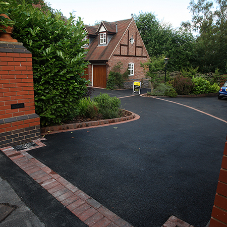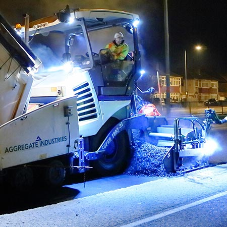A blog written by Aggregate Industries
The deployment of effective sustainable drainage systems (SuDS) has, to date, been far too slow, and often treated as an afterthought of any new build or project. However, evolving legislation, climate change and the social pressure to prioritise green spaces are all making the use of SuDS more critical than ever before.
Currently, around five million people live in flood risk areas in England and Wales. However, with the Environment Agency estimating an average global temperature rise of 4°C (far above the target of 1.5°C set in the legally binding 2015 Paris Agreement) by the 2080s, many at-risk UK towns may have to be abandoned altogether – that is, unless tangible action is taken now.
Although the government passed a law requiring all new developments to include sustainable drainage systems (SuDS) in 2010, it quickly put the rules on hold in a bid to help developers keep costs down and speed up house-building rates.
While not a new concept, a good and often underutilised starting point lies with a SuDS strategy. In short, SuDS is a multi-layered drainage system designed to manage surface water runoff, in a bid to decrease flow rates to watercourses and improve water quality, in a more sustainable and effective way than by conventional drainage such as pipes and tanks.
A typical SuDS will use a combination of water practices to form a holistic management system. This could include source control methods designed to decrease the volume entering the watercourses, such as a green roof comprising vegetation, and landscape designed to intercept and retain precipitation.
Pre-treatment steps, such as vegetated ditches help to remove pollutants, and this may be supported with retention ponds, providing storage and treatment for excess water, and infiltration systems, such as trenches and soakaways.
The considerations don’t end there. A permeable surface material is the ideal option to support, and fully maximise the benefits of SuDS. This could be, for example, a fast-draining concrete block paving solution designed specifically to direct excess water away from streets, parking surfaces and driveways, or a porous asphalt blend which will aid water flow measures in vehicle trafficked areas. Here the remit is to allow water to pass through the material into the underlying permeable sub-base, thereby maximising control measures.
Of course, this approach requires investment; but it delivers benefits on multiple fronts.
When formalised as an integral part of the design process, SuDS can significantly help control run off and reduce peak flows, therefore reducing the risk of flooding, while also improving the water quality with the removal of pollutants.
Merchants will no doubt be aware of the growing noise around sustainability, particularly in construction, so it’s worth reminding customers that the SuDS design can create new habitats and rehabilitate or enhance existing ones.
As we look to the future, the only way to tackle the current housing deficit will be to build more, but with flood incidents only set to increase, it will become ever more important for preventative measures to be incorporated into the inaugural development stages.
Furthermore, with the government currently working on the latest draft of its Flood and Coastal Erosion Risk Management Strategy, and flood-risk becoming an even more prominent consideration for house buyers, the issue isn’t going to go away.
For that reason it is time for housebuilders to invest in SuDS to protect homeowners from flooding.
As we move towards becoming a sustainable society, merchants have an important role to play in addressing how SuDS can benefit the landscape and community. The key is to work closely with developers, builders and project managers, to offer an understanding of how the multi-layered drainage system can provide a more sustainable and effective solution, and advise customers on the best solutions for their needs.
SuD's Up with Aggregate Industries [Blog]
| T | 01530 510066 |
|---|---|
| F | 01530 249542 |
| E | asphalt@aggregate.com |
| W | Visit Aggregate Industries - Asphalt's website |
| Bardon Hill, Coalville, Leics, LE67 1TL |

![SuD's Up with Aggregate Industries [Blog]](/SUDS%20008-file115103.jpg)










